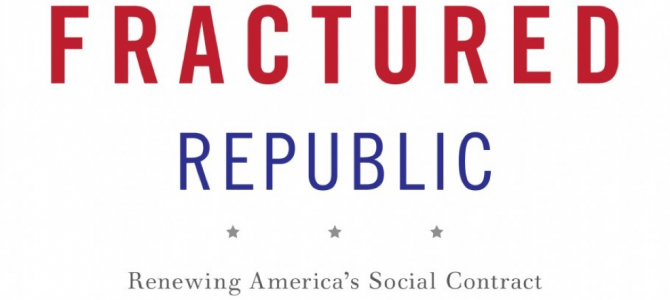
Yuval Levin is not yet 40 years old, and already he is one of the leading intellectual lights of the conservative movement. His laurels are almost tedious to list, but it’s worth noting that in 2013 he won the prestigious Bradley Prize. Levin is currently the editor of National Affairs, which has fast become essential reading for its insightful essays on policy and cultural debates. Additionally, he is the Hertog Fellow at the Ethics and Public Policy Center, a senior editor of The New Atlantis, and a contributing editor to National Review and The Weekly Standard.
As such, the recent release of his fourth book, “The Fractured Republic: Renewing America’s Social Contract in the Age of Individualism,” qualifies as something of an event. The book attempts to address a problem that is at once timely and acutely felt by the conservative movement: how do social conservatives — and anyone else hoping to maximize individual freedom — escape the cultural and political hegemony of the American Left, which is now so total as to make a federal civil rights case over sex-specific bathrooms in public schools?
The Federalist asked five notable writers and thinkers for their thoughts on Levin’s book, and how it can help us piece back together our fractured republic.
(1) Ed Whelan, President of the Ethics and Public Policy Center
It won’t surprise anyone familiar with the outstanding work of my Ethics and Public Policy Center colleague, Yuval Levin, that deep wisdom and sparkling clarity radiate from nearly every page of “The Fractured Republic.”
Where are we as a nation? How did we get here? What is the best path forward? No matter their politics, all readers will both learn from and be challenged by Yuval’s framework and insights.
For social conservatives — a group with which he and I both identify — Yuval offers a particularly sober assessment. The collapse of the family, “the core character-forming institution of every human society,” reflects the loss of a societal consensus about the value of the family. That bad news is compounded by the fact that many Americans who had been “nominally religious” have increasingly declared themselves to be nonreligious. This shift means that social and religious conservatives “have lost their place of honor in the moral life of our society” and are poorly positioned to plead for the family and for the traditional virtues that sustain it.
Instead, Yuval argues, amidst the widespread misery, loneliness, and despair that have resulted from the rejection of those virtues, social conservatives can best make their case for human flourishing by “building thriving subcultures.” We can most powerfully “illustrat[e] the possibility of a more appealing form of modern life by living it.”
Alas, in the face of the totalizing claims of modern progressives and their aggressive deployment of the judicial-bureaucratic apparatus to enforce those claims, it is far from clear that we will even be permitted the space needed to build our subcultures. I look forward to Yuval’s wise counsel on how to secure this space.
(2) Rachel Lu, Senior Contributor for The Federalist
It’s fortuitous that this book would be released right now, just as conservatives are trying to discern a way forward after the implosion of their party’s platform. Levin has for several years been one of conservatism’s brightest intellectual lights, but this contribution is especially significant because it explains why our politics has grown so frenzied and desperate of late.
Dominated by a Boomer-oriented conception of what our body politic should be, we’ve been straining to return to a decades-old political model that can’t work for us anymore. By accepting that the middle-class conformity of the post-WWII era was largely a historical aberration, we may be able to free ourselves from that ill-fitting paradigm. Suddenly our political objectives might start to seem more relevant and attainable.
Four years ago Charles Murray warned us, rather gloomily, that America was coming apart. Levin agrees, but points out that Americans through most of their history were far more “apart” than in the America of Murray’s childhood. We still managed to pull together and forge a great nation, so there’s reason to think we can do it again.
To be sure, “The Fractured Republic” leaves us with a lengthy to-do list. Even if conservatives can agree that federalism and subsidiarity are the answers, how do we persuade everyone else? Is a resurgence of localism really possible now that so many of our citizens identify more as Americans than as Nebraskans, Floridians, or New Hampshirites? Now seems like an excellent time for delving into those questions.
(3) Jonah Goldberg, Senior Editor of National Review and Syndicated Columnist
Yuval Levin is one of the most important conservative intellectuals of his generation, so his books are worth reading almost regardless of the topic. But “The Fractured Republic” stands on its own as an indispensable piece of work. Conservatives and libertarians have been making the case for federalism, and before that, subsidiarity for a very, very long time. Simply put, pushing policy decisions to the most local democratic level possible is simply the best way to maximize human happiness; more people get to live the way they want to live.
If all he did was explain this point to a new generation, Levin would be providing a useful service. But he goes further than that. He explains how our national sclerosis is driven not just by the usual collective action problems described by countless scholars since Mancur Olson; it’s fed and fueled by a crippling nostalgia on both left and right. The Left wants to live in 1965, the Right in 1981. Both nostalgic visions involve a conception of government unsuited to the age we live in now — or will live in tomorrow.
One can see the cognitive dissonance most clearly in young liberals, who want a bespoke lifestyle-on-demand yet think an ever larger centralized government can secure it. The iPhone generation votes for a post office party. Young conservatives, but particularly older ones, also have a vaguely nationalistic yearning to live in a continent-spanning culturally (if not necessarily ethnically) homogeneous society. Both desires are understandable, but neither is realistic. In other words, everyone has an understandable (I would argue innate) desire for social solidarity, but the means they pursue cannot yield the ends they seek.
The only practical way of providing people both individual liberty and a sense of real belonging in a community that reflects their own cultural preferences is devolve more sovereignty to local communities. As long as we think that the government in Washington can provide a sense of meaning to everyone the more people will feel alienated and aggrieved.
There’s an old saw about the kid who solves the problem of a truck trapped in a tunnel: “Why don’t you let the air out of the tires?” Levin’s solution is to do exactly that. A freer national society will be one that allows for more communities to answer the ancient Aristotelian question, “How shall we live?” as they see fit.
If local answers to these questions create losers — they will but fewer than there are now — there’s a solution to that: fight democratically at the local level. If you still lose, at least the winners will have to look the losers in the eye at soccer games and grocery stores — which fosters a humility in policymaking utterly lacking in large nationalized bureaucracies. And if the losers still aren’t happy, there’s another solution that is as old as mankind itself: move to a place and a community more to your liking.
(4) R.R. Reno, Editor of First Things
We’re in a bad way, as the ascendancy of Donald Trump and surprising success of Bernie Sanders make clear. In “The Fractured Republic,” Yuval Levin goes a long way toward explaining why. We’ve inherited a politics of freedom that is increasingly irrelevant to our present circumstances. The Left wants ever-greater personal liberation. The Right calls for greater economic freedom. Meanwhile, voters rebel, siding with candidates who promise strength, security, and protection.
Although written before this year’s electoral surprises, Levin provides clarifying analysis. Both the cultural politics of freedom on the left and the economic politics of freedom on the right emerged against the background of a consolidated country in mid-20th-century America. Post-war politics could take solidarity for granted and thus pushed for greater individualism and freedom against the background of a presumed stability and togetherness.
Now we are entering a new era, one in which freedom is becoming our society’s affliction, not the hoped-for solution. When well-educated young people with every reason to expect to succeed in our globalized free-market system vote for an aging socialist, you’d better take notice. It suggests a desire for stability — a solid place to stand — in a now hyper-mobile, hyper-flexible world. The same goes for Trump voters. They’re disoriented by “creative destruction” and our multicultural weakening (and commodification) of once traditional forms of life. To them, “Make America Great Again,” means make America stable and secure again.
Both types of voters are styled “anti-establishment” by pundits. I’d say they’re better described as Americans who fear there are no trustworthy bonds, no enduring solidarity, no lasting home.
When I put down “The Fractured Republic,” I found myself thinking about the future. Post-war American politics encouraged cultural and economic freedoms that, to one degree or another, all of us wanted. Levin is right that the next generation of politics won’t be able to turn back the clock. Our political future will have to presume a globalized free-market system that tends to dissolve strong social bonds, as well as a culture of self-expression unlikely to tolerate much in the way of moral authority. That said, his book reinforced my view that the political party that can find its way to a new, workable, and believable rhetoric of solidarity, one suited to our present circumstances, will dominate the next generation.
For my entire life, American public life has been characterized by calls for freedom against the backdrop of a taken-for-granted solidarity. Now the wheel is turning. The future will see calls for solidarity against the backdrop of a taken-for-granted freedom.
(5) John Stonestreet, President of the Colson Center and co-host of BreakPoint
The respective visions of both the political left and the political right are dependent on a culture that no longer exists. Just as Ross Douthat highlighted the loss of a religious center in his book Bad Religion, Yuval Levin explains the loss of a cultural center in “The Fractured Republic.” If you wish to understand reason why this current election cycle is so strange and disturbing, and in particular why the candidates seem so misaligned with what is incessantly articulated by both right and left, read this book. Levin sends our attention upstream, both in describing the problem and pointing to a solution.
Certainly, “The Fractured Republic” is not the first book to point to the collapse of the institutions of civil society, nor the first to call all who care to turn their focus locally to rebuilding our social lives together. But, it is among the most compelling cases and the timing is perfect. Hopefully, the realities of our cultural moment will feed a felt need, which is in fact a real need, to take his diagnosis and prescription seriously.









